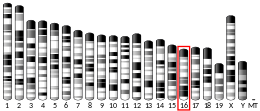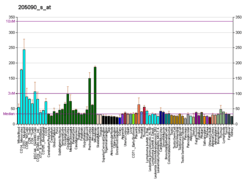NAGPA
N-acetylglucosamine-1-phosphodiester alpha-N-acetylglucosaminidase is an enzyme that in humans is encoded by the NAGPA gene.[5][6][7]
Hydrolases are transported to lysosomes after binding to mannose 6-phosphate receptors in the trans-Golgi network. This gene encodes the enzyme that catalyzes the second step in the formation of the mannose 6-phosphate recognition marker on lysosomal hydrolases. Commonly known as 'uncovering enzyme' or UCE, this enzyme removes N-acetyl-D-glucosamine (GlcNAc) residues from GlcNAc-alpha-P-mannose moieties and thereby produces the recognition marker. This reaction most likely occurs in the trans-Golgi network. This enzyme functions as a homotetramer of two disulfide-linked homodimers. In addition to having an N-terminal signal peptide, the protein's C-terminus contains multiple signals for trafficking it between lysosomes, the plasma membrane, and trans-Golgi network.[7]
References
- GRCh38: Ensembl release 89: ENSG00000103174 - Ensembl, May 2017
- GRCm38: Ensembl release 89: ENSMUSG00000023143 - Ensembl, May 2017
- "Human PubMed Reference:". National Center for Biotechnology Information, U.S. National Library of Medicine.
- "Mouse PubMed Reference:". National Center for Biotechnology Information, U.S. National Library of Medicine.
- Kornfeld R, Bao M, Brewer K, Noll C, Canfield W (Jan 2000). "Molecular cloning and functional expression of two splice forms of human N-acetylglucosamine-1-phosphodiester alpha-N-acetylglucosaminidase". J Biol Chem. 274 (46): 32778–85. doi:10.1074/jbc.274.46.32778. PMID 10551838.
- Do H, Lee WS, Ghosh P, Hollowell T, Canfield W, Kornfeld S (Aug 2002). "Human mannose 6-phosphate-uncovering enzyme is synthesized as a proenzyme that is activated by the endoprotease furin". J Biol Chem. 277 (33): 29737–44. doi:10.1074/jbc.M202369200. PMID 12058031.
- "Entrez Gene: NAGPA N-acetylglucosamine-1-phosphodiester alpha-N-acetylglucosaminidase".
Further reading
- Lee JK, Pierce M (1995). "Purification and characterization of human serum N-acetylglucosamine-1-phosphodiester alpha-N-acetylglucosaminidase". Arch. Biochem. Biophys. 319 (2): 413–25. doi:10.1006/abbi.1995.1312. PMID 7786023.
- Andersson B, Wentland MA, Ricafrente JY, et al. (1996). "A "double adaptor" method for improved shotgun library construction". Anal. Biochem. 236 (1): 107–13. doi:10.1006/abio.1996.0138. PMID 8619474.
- Page T, Zhao KW, Tao L, Miller AL (1997). "Purification and characterization of human lymphoblast N-acetylglucosamine-1-phosphodiester alpha-N-acetylglucosaminidase". Glycobiology. 6 (6): 619–26. doi:10.1093/glycob/6.6.619. PMID 8922957.
- Yu W, Andersson B, Worley KC, et al. (1997). "Large-scale concatenation cDNA sequencing". Genome Res. 7 (4): 353–8. doi:10.1101/gr.7.4.353. PMC 139146. PMID 9110174.
- Rohrer J, Kornfeld R (2001). "Lysosomal hydrolase mannose 6-phosphate uncovering enzyme resides in the trans-Golgi network". Mol. Biol. Cell. 12 (6): 1623–31. doi:10.1091/mbc.12.6.1623. PMC 37329. PMID 11408573.
- Lee WS, Rohrer J, Kornfeld R, Kornfeld S (2002). "Multiple signals regulate trafficking of the mannose 6-phosphate-uncovering enzyme". J. Biol. Chem. 277 (5): 3544–51. doi:10.1074/jbc.M108531200. PMID 11723124.
- Strausberg RL, Feingold EA, Grouse LH, et al. (2003). "Generation and initial analysis of more than 15,000 full-length human and mouse cDNA sequences". Proc. Natl. Acad. Sci. U.S.A. 99 (26): 16899–903. doi:10.1073/pnas.242603899. PMC 139241. PMID 12477932.
- Ota T, Suzuki Y, Nishikawa T, et al. (2004). "Complete sequencing and characterization of 21,243 full-length human cDNAs". Nat. Genet. 36 (1): 40–5. doi:10.1038/ng1285. PMID 14702039.
- Gerhard DS, Wagner L, Feingold EA, et al. (2004). "The status, quality, and expansion of the NIH full-length cDNA project: the Mammalian Gene Collection (MGC)". Genome Res. 14 (10B): 2121–7. doi:10.1101/gr.2596504. PMC 528928. PMID 15489334.
- Nair P, Schaub BE, Huang K, et al. (2005). "Characterization of the TGN exit signal of the human mannose 6-phosphate uncovering enzyme". J. Cell Sci. 118 (Pt 13): 2949–56. doi:10.1242/jcs.02434. PMID 15976452.




